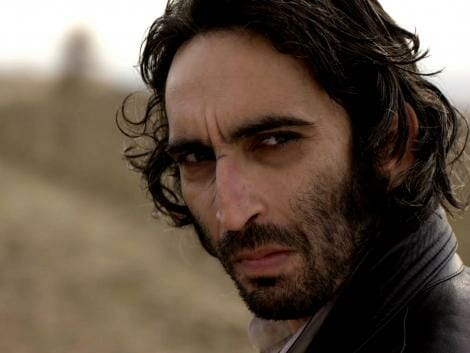
Once Upon a Time in Anatolia, co-written and directed by Nuri Bilge Ceylan, is a Turkish police procedural based on the real-life experiences of one of the writers. The story follows a group of men as they travel around the Anatolian steppe at night in three cars in search of a buried body. The main homicide suspect, Kenan (Firat Tanis), is being escorted from one location to the next as part of a deal he’s made with police Commissar Naci (Yilmaz Erdogan) to identify the grave of the man he murdered. In exchange for the informaiton, he hopes to secure the release of his brother, suspect number two, Ramazan (Burhan Yildiz). They are accompanied on this overnight search by police officers, grave diggers, gendarmerie, as well as Prosecutor Nusret (Taner Birsel), and Doctor Cemal (Muhammet Uzuner). Nusret and Cemal each prove bastions of cynical, yet humane, reason in the face of Naci’s explosive temper and Kenan’s inexplicable brutality. Every character in this film has a story that they repeat over and over. These stories range from idle chit-chat in the car that’s repeated and exaggerated, to the story of the homicide itself, which is told numerous times by Naci, Nusret and Kenan.
Despite these repeated tellings, no real truth ever fully comes to light, for no story in this film is fixed—each is constantly changing and adapting. Once Upon a Time In Anatolia insists that no matter how large or small they may be, these lies, these changing stories, are a necessity in order to deal with life and carry on.
Early in the film, the driver, Arab Ali (Ahmet Mümtaz Taylan), suggests to Dr. Cemel that one day this hunt for the body will be something he can tell his children about. But as the film makes clear, the stories here are not for children. These are stories that have been warped by the mind of the teller in order to protect himself, and those he loves, then repeated over and over until they’ve become true.
Among this multitude of stories, many parts of the film are left unexplained, or intentionally vague. The film opens with the two brothers and their victim having a friendly meal together, Ramazan confesses and is then hushed, and the doctor tells a crucial, unprecedented lie. Instead of making the film feel incomplete, these unanswered questions instead suggest the complexity and endless nuances of humanity and the story that is being told here. Once Upon a Time In Anatolia implies that the audience has only been granted access to this brief portion of a much larger world that extends beyond the confines of the film. The intense introspection of the plot is broken up with interludes of immense, unforgettable images: the perfectly composed, wide-shots of rolling Anatolian countryside illuminated by the ghostly beams of light from the gendarmerie’s truck; the light and shadows from the gas lamp swirling around their host’s beautiful daughter as she serves the men tea; Doctor Cemal staring at himself, unflinchingly, in the mirror.
Once Upon a Time In Anatolia is a slow film, but it is deliberately so; the audience becomes participants, and witnesses, in a sense, to a strangely complex, endlessly redundant process. By the end of the two and a half hours, the viewer has become thoroughly involved in everything that’s happened and cannot help but begin to construct his or her own story of the events and how they took place. As a result, the viewer becomes just as guilty as the characters of justifying and rationalizing a story that refuses to be clarified and categorized so simply.
Director: Nuri Bilge Ceylan
Writer: Ebru Ceylan, Nuri Bilge Ceylan, Ercan Kesal
Starring: Muhammet Uzuner, Yilmaz Erdogan, Taner Birsel
Release Date: Jan. 4, 2012 (limited)